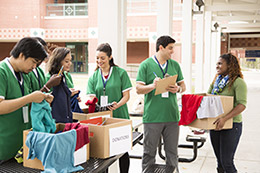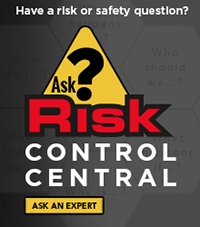Helping Out After a Disaster
When disaster strikes, the effects are often felt across the country. Although the greatest devastation usually occurs in a concentrated geographical region, caring people from across the country feel a calling to help out however they can. Historic events such as hurricanes and tornados have been met with a great outpouring of assistance from individuals and organizations, including those insured by Church Mutual.
If you or the people of your organization choose to provide assistance to those in need, you should first consider the best way to lend your support in order to keep you and your people safe and to prevent from further complicating a chaotic scene and situation.
Donations
 In many cases, the best way for concerned people and organizations to assist those in need is to provide financial donations. Although this may appear to be the “easy way out” on the surface, financial support for victims of a disaster is often the most efficient and effective form of assistance. Donating money to one of several reputable organizations results in the following benefits:
In many cases, the best way for concerned people and organizations to assist those in need is to provide financial donations. Although this may appear to be the “easy way out” on the surface, financial support for victims of a disaster is often the most efficient and effective form of assistance. Donating money to one of several reputable organizations results in the following benefits:
- Assistance is delegated by staff experienced with disaster relief.
- Financial donations are quickly and easily transferred and directed to people or groups who need it most.
- Monetary assistance is often used to make purchases in areas affected by the disaster, thus stimulating the local economy.
If you or your organization chooses to also donate tangible items to the disaster relief cause, it is important to confirm what is truly needed and requested before taking action. Donating items that are not in need may cause logistical problems and consume valuable resources needed to process supplies in greater demand. Check with reputable disaster relief organizations before gathering and donating tangible items.
Whenever making donations, use these tips to ensure your donations will be handled responsibly:
- Use caution when making online donations, especially when funds are solicited though via an email link.
- Check to see if the organization has an on-the-ground presence and that they will in fact be able to provide the direct assistance they promise.
- Verify the charity to which you are donating is accredited by the BBB.
Sending Volunteers
 Another way for your organization to assist following a disaster is to send staff or volunteers to the area. The rebuilding efforts are a huge undertaking that rely on the assistance of volunteers from throughout the United States. Church Mutual recommends, however, that your organization DOES NOT deploy people on your own to an impacted area, as this can cause undue hardship to your volunteers and the unfolding event due to poor planning, communication, and coordination. Instead, reach out to your local Red Cross, Salvation Army, or other organized disaster relief operation. Each can provide you with resources and contact information to make your volunteer efforts as efficient and effective as possible.
Another way for your organization to assist following a disaster is to send staff or volunteers to the area. The rebuilding efforts are a huge undertaking that rely on the assistance of volunteers from throughout the United States. Church Mutual recommends, however, that your organization DOES NOT deploy people on your own to an impacted area, as this can cause undue hardship to your volunteers and the unfolding event due to poor planning, communication, and coordination. Instead, reach out to your local Red Cross, Salvation Army, or other organized disaster relief operation. Each can provide you with resources and contact information to make your volunteer efforts as efficient and effective as possible.
As you plan to send volunteers to areas affected by disaster, be aware of these common concerns:
Management
Managing and organizing volunteers after a disaster can be a difficult task, so the first step when planning a disaster relief trip is to establish a coordinator. Appoint a coordinator who can focus their efforts on the many aspects of managing volunteer labor. The coordinator should always contact and work with local emergency management officials prior to implementing any volunteer strategy. They should also require volunteers to do the following:
- Undergo background screening: All volunteers working with minors or who are entrusted with access to your money or financial information should undergo background screening.
- Complete documentation: Protect your organization from liability by requesting the following documentation:
- All volunteers should submit a formal volunteer application and agree to a background check (if needed).
- Request a signed Indemnity and Release form from all volunteers.
- Obtain medical clearance: Require all volunteers to consult with their physician and supply a doctor’s note of approval before traveling to receive medical clearance and any necessary vaccines. Read Health Recommendations for Relief Workers Responding to Disasters for more information.
Logistics
Once you connect with local emergency management officials, work with them to develop your volunteer strategy. Some things to consider are:
- The number of people needed based on the tasks to be performed.
- Timeframe and location for which your efforts will take place.
- Lodging accommodations for volunteers.
- Vehicles used to transport volunteers to the impacted area.
- Food and water for volunteers.
You may review Church Mutual’s page on Volunteer and Safety Management. For more detailed information, visit Emergency Response Resources from the CDC.
Tools and Equipment
Volunteers visiting disaster areas must be prepared with the tools and equipment needed to keep them safe and accomplish their tasks effectively. Many common items used by disaster response teams include the following:
- First Aid Kit
- Food and water supply
- Safety googles
- NOAA weather radio
- Gloves
- Cash
- Hearing protection
- Floatation devices
- Flashlights and extra batteries
- Helmets
- Dry clothing, towels, and blankets
- Emergency contact info and phone
- Sturdy, slip resistant footwear
Coordinate with local emergency management officials to determine what other tools may be needed.
Volunteer Safety
Prior to implementing your plan to volunteer following a disaster, it is important to recognize what safety precautions need to be in force. Consider the following for your disaster relieve efforts:
- Work with the organization leading the disaster recovery efforts and coordinate with them to ensure it is safe to arrive. Also stay informed by listening to local news updates.
- Pay attention to road closures and cautionary signs and never drive through flood waters. When disasters occur many roads will be closed or impassible due to safety hazards.
- Avoid coming in contact with flood waters as they often contain toxins, chemicals, debris and possible live power lines.
- Report gas leaks or downed power lines to local authorities and evacuate the area immediately.
- Use a respirator when working near areas with mold or asbestos - experts recommend an N95 respirator.
- Never use generators indoors.
- Match work with ability and skill: Volunteers are often eager to help out any way they can. Although enthusiasm is always appreciated, volunteer organizers should encourage volunteers to work within their means.
- Ability: Volunteers who overextend themselves are more susceptible to injury. Consider attributes (such as physical ability), which may be necessary to complete a task, and delegate work accordingly. Refer to local child labor laws when volunteers are minors and take extra precautions to ensure their safety.
- Skill: When assigning tasks, ensure volunteers are equipped with the proper skills and training needed to complete their jobs. This may include providing instructions for using power tools and guidance on what to do if there is an accident.
- Regularly communicate with your family and volunteer coordinators. If you or someone else becomes lost, make sure to register with the American Red Cross Safe and Well Program.







